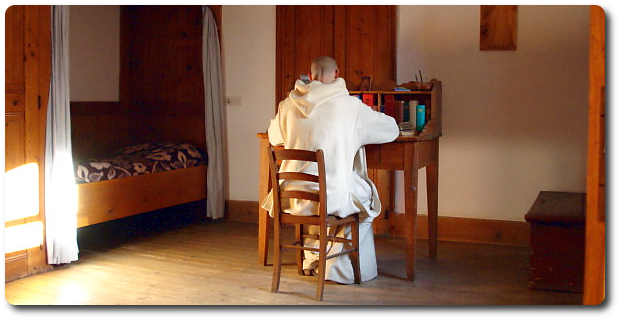
History
The Carthusian
Order Today
Structure
of the Order
Spirituality
Role in the Church
Brothers
Liturgy
Community
Daily Schedule
Admittance
and Novitiate
Texts
Visit
Products

Two Different Ways“Our supreme quest and goal is to find God in solitude and silence” (Rule 4,1). Towards this single purpose Carthusians aspire in two different forms of life: as fathers (cloister monks) or as brothers (lay monks). For a better understanding between these two, see Father or Brother?.Solitude of the FathersThe fathers – all are or will be priests – live in their cells along the cloister, leaving them only at appointed hours of liturgy in choir or infrequent occasions of common recreation. Fidelity to the cell is of crucial importance in Carthusian life. “This is holy ground, a place where, as a man with his friend, the Lord and his servant often speak together; there is the faithful soul frequently united with the Word of God; there is the bride made one with her spouse; there is earth joined to heaven, the divine to the human” (Rule 4,1).The CellThe cell is actually a two-storied small house surrounded with its own, enclosed little garden. Downstairs is the workroom, furnished with tools necessary for work, for the fathers also perform manual labor in cell; upstairs there is an anteroom, called the “Ave Maria”, a small bathroom and bedroom (cubiculum) where the monk spends most of his time: here he prays, studies, eats and sleeps.Food and FastFood is received through a small window by the entrance twice a day – during winter-time only once, in the evening taking bread and beverage. The food is abundant and well prepared. Meat – except fish – is never eaten. Once a week – normally on Friday – monks have “abstinence”, when they take only bread and water. During Advent and Lent they also refrain from dairy products. Such fasting regulations usually require considerable sacrifice, though by no means are they harmful to one’s health. To the contrary, Carthusians frequently live to advanced old age. Novices accustom themselves to the fast gradually, under the direction of the Novice-Master.Organization of TimeIn the organization of time for work and study, as well as in spiritual occupations, the novices and junior professed follow the order set forth by the Fr. Master; afterwards, monks – within the framework of the liturgical hours – freely arrange their own time. As to the daily schedule, see Daily schedule. |  Address: Kartuzija Pleterje Drča 1 8310 Šentjernej Slovenija Tel: +386 (0)7 30 81 225 E-mail:  Web site of the Grande Chartreuse: www.chartreux.org |
